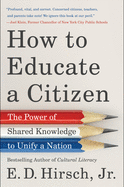
How to Educate a Citizen: The Power of Shared Knowledge to Unify a Nation by E.D. Hirsch, Jr., confronts the precipitous decline in academic performance of U.S. students compared to their international peers. Hirsch illustrates that the country's child-centered elementary schooling model is failing its children, especially the most disadvantaged ones.
A lifelong educator, Hirsch (Why Knowledge Matters; The Making of Americans; Cultural Literacy) established the Core Knowledge Foundation to promote educational equity in schools. While other developed countries teach standardized curricula rich in civics, history and tradition, most U.S. schools emphasize general skills such as critical thinking without imparting the essential shared knowledge, including civics and history, that is the mark of an educated citizen. Students grow up untethered to their American identity, resulting in what Hirsch refers to as "a knowledge gap, a communications gap and an allegiance gap."
Addressing parents, Hirsch points to the latest scientific research to demonstrate that young brains are primed for absorbing content and capable of inhabiting more than one identity. He shares examples of successful core knowledge-focused schools around the country, recommending that all elementary schools adopt content-specific curricula to unite the multiethnic nation's children under a shared U.S. nationality and improve their academic performance.
Readers cautious about a nationalistic, uniform approach to educating youth will discover in Hirsch's manifesto several compelling reasons for doing so, including the indisputable fact that a unified nation is better equipped to cooperate on international matters than one as polarized as the U.S. in the 21st century. --Shahina Piyarali, writer and reviewer

